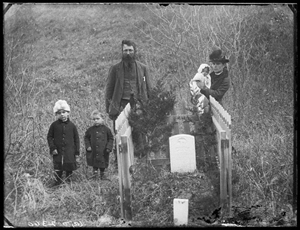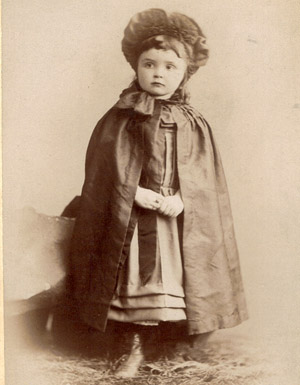Funerals
Not only were class and economics inescapable issues during life, but they had the power to govern the treatment of the dead. Elia Peattie, as a reporter of the goings-on in Omaha, was well-acquainted with this fact. During the 1890s, Peattie wrote many times about those who had passed into the next realm as well as the circumstances surrounding their demise. One Easter weekend, her column nearly shook with her own personal disbelief over the refusal of a certain minister to conduct funeral services for a young woman whom he considered to have led a life of sin. The girl had died at the "Open Door," a charitable home established for "fallen" women desirous of changing their lives. "He was engaged in trimming the church with Easter flowers," Peattie wrote, "and looked down from his height on the step-ladder and from his state of pharisaical purity, to say that he did not think such persons ought to have a Christian burial. Yet he was decorating the sanctuary in honor of Him whose death he believed had taken away the sins of the world!" [1]

During a bitterly cold January of 1892, Peattie shared with her readers her sorrow over the circumstances surrounding the death of Mrs. Julia Judd. The young woman had been the mother of two young children, and she served as the family's sole bread-winner as her husband was an invalid. She had been a laundress. "This is the case of destitution," wrote Peattie, "[I] mentioned in this column a few days ago." Since the family was without funds, the county "poor authorities" had furnished a coffin for the deceased to be laid in. Peattie lamented that the plain pine box was "not even stained on the outside or planed-off or painted on the inside. In the end where the head was to rest was a bunch of shavings and a roll of old newspapers, intended for the head to rest upon." [2] Upon receiving her report, Peattie's readership took matters into their own hands, donating not only a new coffin of a decidedly finer quality but also contributing the use of a carriage for the transport of the dead mother to her burial spot. A collection was even taken up to pay for the funeral service itself. The burden of great sadness that the little family bore was to a small degree shared; perhaps, it was even lessened by the presence of a few others. Although Julia Judd's interment was modest by any standard, a queen laid to rest could not have been surrounded by any more sincere fellow-feeling than what evidenced that winter's day.
Peattie also saw, however, that some in Omaha in the 1890s made use of the funeral of a loved one to evidence grandiose gestures of a different nature. She decries the fact that when the vanity of the living survives, "the expensive funeral is a matter of course." [3] "Surely is this love?" she asks, but her question elicits the echoes of deeper ones concerning the very nature of love itself. It conjures issues reflective of her time, of how one truly loves another in life, or how in death one affords the deceased genuine respect and reverence.

During the latter part of the nineteenth century, the ways in which death and burials were handled did indeed change. In the early days of colonization on the frontier, funerals had been private affairs, carried out on family land with few besides relations in attendance. At the century waned, however, family funerals markedly declined. In 1892 the National Funeral Directors Association was formed and put forth expectations of how the dead ought to be cared for. The organization "revised funeral services by modifying the care of the body, the container for the body, the place of the funeral, and the service itself." [4] These new, specific protocols were intended to impart a sense of order, security, and propriety to the family in mourning. imple commemoration of the deceased's life toward adherence to the specific manner in which he or she was ushered out of this world spoke of a deeper, rising issue in the American experience. It reflected the emerging "demands of a maturing American capitalism." [5] Funeral ceremonies did become more elaborate; rural garden cemeteries were developed to replace the corner of the family farm or the "harsh" urban plots that were used by those who dwelt in cities. Death itself became more of a social production and less of a religious event. Peattie witnessed this evolving trend. She sometimes saw it taken to fancy, almost party-like extremes in the cases of the very rich, as described in the following editorial; however, she also saw the common, the poor, those typified by Julia Judd of Omaha, those who were buried without even a pillow to place under their heads.
Read Peattie's Writings
References
Farrell, James J. Inventing the American Way of Death, 1830-1920. Philadelphia: Temple University Press, 1978.
Peattie, Elia. "A Word with the Women." Omaha World-Herald. 21 January 1892: 8.
———. "A Word with the Women." Omaha World-Herald. 17 April 1896: 8.
Illustrations
"The Harvey Andrews family posed at the grave of son Willie Andrews." Photograph by Solomon Butcher. Courtesy Nebraska State Historical Society (nbhips 12871).
"Young Girl in Mourning Attire." Courtesy Susanne George Bloomfield.
Notes
XML: ep.owh.rel.0004.xml
